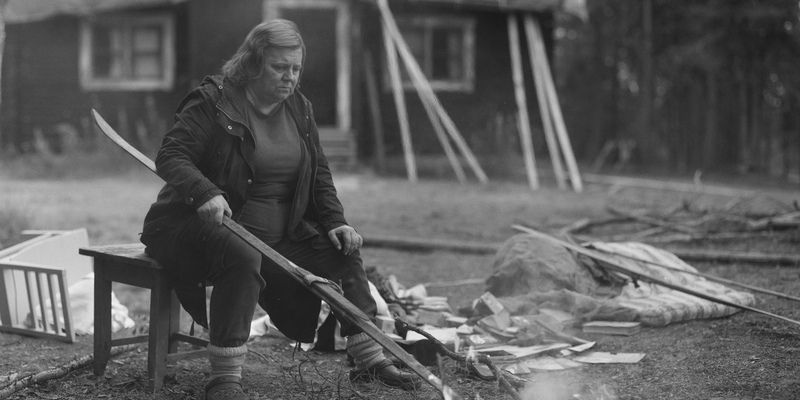
Review by
Eric Hillis
Directed by: Katja Gauriloff
Starring: Agafia Niemenmaa, Heidi Juliana Gauriloff, Sanna-Kaisa Palo, Seidi Haarla, Erkki Gauriloff, Matleena Fofonoff
There's a scene early on in director Katja Gauriloff's
Je'vida in which an elderly man is fishing on a lake with
his young granddaughter. When asked why he only takes a certain amount
of fish from the lake on each trip, the man tells the child of the
importance of ensuring the body of water remains stocked with a
population of fish. He's talking about fish in the literal sense, but
his sentiment forms the basis of the central theme of
Je'vida, that of a disappearing people, the Skolt Sámi of Lapland.
Je'vida is the first feature film to fully employ the
Skolt Sámi dialect, whose native speakers have now dwindled to less than
300. Through the film's narrative we see how this came to be, as the
Skolt Sámi are subjected to what amounts to a form of cultural genocide
enacted by Finnish authorities eager to homogenise their country.

The film opens with two women travelling to Lapland following the death
of a woman who has left her childhood home to both of them. Sanna (Seidi Haarla) is the late woman's daughter and has just met her aunt Lida (Sanna-Kaisa Palo) for the first time. Raised by her mother in Stockholm, Sanna had no
idea of her family's Sámi roots, and was completely unaware of the
existence of her aunt, who is none too pleased to meet her niece.
Arriving at the family home, on the shores of a scenic lake, Sanna
immediately feels as though she's arrived at a home she never knew she
longed for. Lida, on the other hand, is keen to get the place cleared
out and move on. As Lida hurls the contents of the home onto a bonfire,
Sanna tries to get her to open up as to why the place causes her aunt
such pain.
This initiates a flashback narrative that introduces us to Lida as a
young girl, then known by the name Je'vida and played by a revelatory
first-timer in Agafia Niemenmaa. The young Je'vida clearly loves
her life, and particularly likes to spend time with her aforementioned
grandfather (Erkki Gauriloff). Her mother however wants Je'vida
to integrate into Finnish culture, leading to Je'vida and her older
sister being sent to a boarding school where she's taunted by classmates
and bullied by teachers and staff determined to beat her culture out of
her, renaming her Lida in the process. This harrowing segment plays in
similar fashion to the recent Belgian drama
Playground, with Je'vida becoming a bully herself in an attempt to survive the
experience.

We later see Je'vida, now Lida, as a hardened young woman who seduces a
visiting engineer from the South as a means of leaving the frozen North.
When her grandmother arrives for a visit, clad in the distinctive Sámi
garb, Lida hides her away in her apartment, terrified of her roots being
exposed. It's heartbreaking.
Gauriloff opts to tell her story through black and white imagery, both
the present day timeline and the flashbacks. This creates the sense that
the two are very much connected and that the elderly Lida can't escape
her past. As she recalls a time when she was content to live for herself
and her family rather than for a judgemental and bigoted society, she
comes to realise she never should have fled her roots. In Sanna, a
younger generation is represented, one that views with horror the
prejudices that fuelled previous generations.

While highlighting a very specific milieu, Gauriloff draws on
recognisable imagery from a wider cinematic heritage to tell her story.
Lawrence of Arabia's famous "match cut" is replicated, but rather than cutting from a
striking match to the baking desert sun, Gauriloff cuts to an image of
the cool Northern lights. When an interloper sets up a gramophone at a
Midsummer celebration, the Sámi people gather round this curious device
like the early humans of 2001: A Space Odyssey gathering
around the monolith: nothing will ever be the same.
Given the limited talent pool Gauriloff had to cast her film from,
Je'vida is a remarkably well acted film, testament no
doubt to her capabilities as a director of people who were likely eager
to have their stories told as a vital means of preserving their
dwindling society. Hopefully Je'vida will shine a light on
a threatened culture and keep that lake stocked for future
generations.


